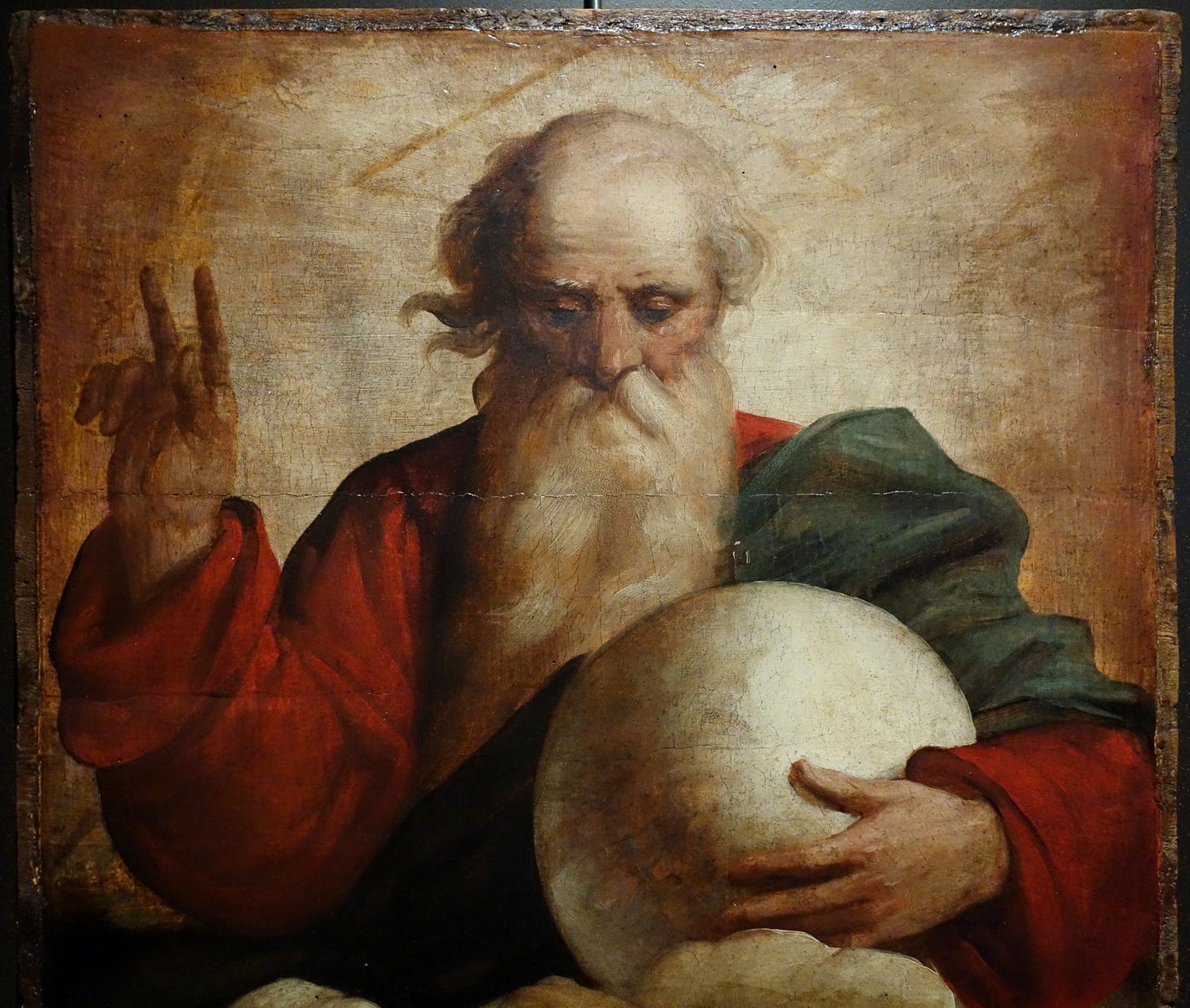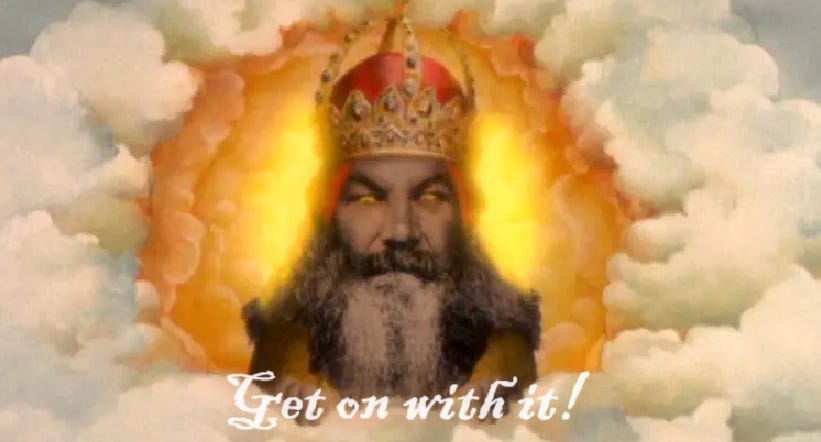The Omnipotence Paradox Just Fails
Can God make a paradox so paradoxical that he cannot solve it?
It has become clear to me that this post is inaccurate. See this post for my explanation.
We have all heard it: “Can God create a rock so heavy that he cannot lift it?” It is the question so hard that it turned Aquinas atheist.1 But finally, after 2500 years, I have come up with the solution, putting this paradox to rest once and for all!
In all seriousness, I know that this is not a very exciting question, and a pretty trivial conclusion, but I thought it would make for a fun short post. And maybe someone will get something out of it - who knows. If anything, you can link to it if you get into an argument with someone on the internet and can’t be bothered to write a response, or something.
It has become clear to me that this post is inaccurate. See this post for my explanation.
The Problem
The paradox, as implied above, starts with the question:
Can God create a rock so heavy that he cannot lift it?
The intuition here is supposed to be that whatever you answer, there is something that God cannot do. If you answer no, then there is something (namely creating the said rock), that God cannot do. If you answer yes, then there is something (namely lift said rock), which God cannot do. Either way, there is something he is unable to do. But God is supposed to be unlimited in power, and if there is something he cannot do, then that poses a limit!
Two Solutions
Here are two ways of solving the omnipotence paradox - each corresponding to a certain definition of “omnipotence”.
Number 1
The first solution is to adopt a Cartesian-esque definition of omnipotence:
x is omnipotent IFF x can bring about ANY state of affairs - logically possible or not.
On this definition the answer to the question is quite straightforward: Yes, God can create a rock so heavy that he cannot lift it. And he can then proceed to lift it.
This is of course a pretty insane response, to put it mildly - and one that I think is incoherent. So I won’t give it much time. But if you think that such a position is tenable, then you have a very easy solution to the paradox. You also have an easy solution to any argument against theism: Sure, I accept that if evil exists then God does not exist, and that evil exists, but God just exists anyways - problem solved!
Number 2
Now, a slightly more serious response. Consider the following definition:
x is omnipotent IFF x can bring about any possible state of affairs.
I think that this fits quite well with what we generally take “omnipotence” to mean; if we found out that God had omnipotence like this, we would not be too disappointed. In other words, if this definition of omnipotence is coherent, then we are justified in saying that some sort of omnipotence is coherent.
Whether you take “possible” here to mean metaphysically or logically possible (if you even think there is a distinction) is not too important, although I would tend towards thinking metaphysical possibility is the best scope to use - for example I don’t think God could make himself not exist or make water not be H2O, even if there is nothing contradictory about those things.
By the way, “state of affairs” should be taken to mean a state of affairs fully explicated. So for example, you might consider the action of doing something immoral. The state of affairs “an agent doing something immoral” is clearly possible (we bring it about all the time), but surely we don’t want God to be able to act immorally, if we take him to be omnibenevolent. However, when we explicate the scenario, it just becomes obvious how to solve it. The state of affairs we are really describing is “an omnibenevolent being, doing something immoral”. Now, if you think omnibenevolence entails never doing something immoral, then the above is clearly contradictory, and if not, then it is just possible and there is no problem created - God can do it. Similarly, you might consider a case like “a state of affairs not brought about by God”. Unless you are an occasionalist, you would probably think that it is possible for a state of affairs to be brought about without God doing it (for example I am bringing about the typing on the keyboard happening now, not God), so God should be able to do it. But once explicated, the state of affairs becomes “God bringing about a state of affairs not brought about by God” which is clearly contradictory and thus not possible. I think this is the point where most people get confused.
Ok, ok, God! Geeze!
So can God create a rock so heavy he can’t lift it. Well, what does “a rock so heavy God cannot lift it” mean, once we explicate it a bit? It of course means “a rock so heavy that a being who can bring about any possible state of affairs cannot bring about the state of affairs of it being lifted by them”. It should be clear to you by now that it doesn’t really matter what we answer:
The concept of such a rock doesn’t seem to contain a contradiction, and so we might think that it possible for God to create it (here many theists would probably differ). And now what? It is literally logically impossible for God to lift it, and so God cannot lift it. But that is just not a restriction to his power - he is still able to bring about any possible state of affairs. Or perhaps we want to say that there is something incoherent about such a rock, such that it is impossible for it to exist. Well, then the state of affairs of it existing is not a possible state of affairs, and so God not being able to create it is no limit to his power.
To say of these states of affairs, which God cannot bring about, that they are “something God cannot do” seems like a bit of a misnomer. They are not coherent states of affairs, and so are not “somethings”, just like a round square isn’t something or a squarpklorp isn’t something.
“But x Theologian Defines ‘Omnipotence’ Differently!”
Sure! Maybe you have some definition of omnipotence which you prefer over the one I have given. Or maybe you have seen a theologian give a definition of omnipotence on which the paradox persist.
That has no bearing on my thesis. All I am claiming is that the definition that I have given fits reasonably with what we would want omnipotence to mean, and that it does not fall prey to the omnipotence paradox. If these two claims are true, then I have shown that the omnipotence paradox is not a problem, for we can have a model of God which is not paradoxical. If some other definition then turns out to be paradoxical, then that is just a reason to reject that definition, but it is not a reason to deny the possibility of omnipotence altogether.
Conclusion
Can God create a rock so heavy that he cannot lift it? It doesn’t really matter. If yes then he is still omnipotent, and if no then he is still omnipotent.
Source: I made it up.




I think this account of omnipotence - x is omnipotent IFF x can bring about any possible state of affairs (fully explicated) - fails.
Plantinga asks us to imagine a being known as McEar, part of whose essence it is that his only ability is to scratch his ear - “McEar can only scratch his ear” is a necessary truth. Under this definition of omnipotence, McEar is omnipotent. Why? Because “McEar creates a rock” is not a metaphysically possible state of affairs. McEar can bring about any fully explicated possible state of affairs because there is no possible state of affairs in which McEar does anything but scratch his ear.
The McEar example gets into some controversial issues, such as whether a being like McEar is even metaphysically or epistemically possible, and if counter-possibles are coherent or useful, so here’s a different example:
Suppose there is an abstract object, like a number or a proposition,
which is essentially unable to bring about any state of affairs because it is causally impotent (by the definition of an abstract object). There is no possible state of affairs “an abstract object does x”, so there is no possible state of affairs that an abstract object cannot bring about.
But that’s because abstract objects literally can’t do ANYTHING - if a definition of omnipotence classifies something that can’t do a single thing as omnipotent, it’s wrong.
Why do we care if some myths and fables from some desert tribes a long time ago are logically consistent? 😉